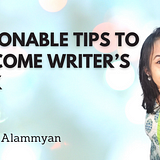3 Biggest English-Speaking Mistakes Made by People Whose First Language isn’t English
And how to fix them

And how to fix them
I’m an Indian, born in Guwahati, raised in a small town called Jorhat in Assam.
I’ve never been to the United States. I’ve never been to the UK. The only reason I know English is because I studied in a Catholic school that took instruction in English very seriously.
I read a lot of books in school. Even then, my English really sucked. When I began writing online, I didn’t know the difference between say and tell, its and it’s, their, there, and they’re, etc.
I’ve spent a lot of time and energy learning English on my own. I feel it’s only fair if I give back to the world and help other non-native speakers like me struggling with their language.
If you’re working on making your written and spoken English better, this series of articles is for you.
Note, if you’re like to watch this in video format, here’s the link:
1. Year vs Years
While introducing themselves, some Indians say, “Hi I’m X, a 19 years old boy from place Y.” I’m not sure if this is prevalent in other countries, but it’s probably something most non-native English speakers can relate to.
The correct usage, in this case, should have been either “I’m a 19-year-old boy,” or simply, “I’m 19 years old.” Or even shorter: “I’m 19.”
The wrong usage probably comes from mixing the two correct ones up.
2. The Unnecessary ‘to’
I’ve observed many non-native speakers, especially Indians, use an unnecessary ‘to’ in sentences, like:
- I’m going to home. (Correct usage: “I’m going home.”)
- I’ll tell to the teacher. (Correct usage: “I’ll tell the teacher.”)
- I’m promising to you I’ll do it.(Correct usage: “I’m promising you I’ll do it” or “I promise I’ll do it.”)
3. Gimme Gimme “More”
Sometimes, people tend to translate their native language directly to English, resulting in an extra ‘more’ in cases where a comparative adjective would be enough. For example
- Incorrect usage: You look more prettier in this photograph than any others. Correct usage: You look prettier in this photograph than any others.
- Incorrect usage: I hope our friendship grows more and more stronger as the years pass by. Correct usage: I hope our friendship grows stronger and stronger as the years pass by.
Note: If you found this article useful, don’t forget to share it with friends who might learn something from this.
Also check out my series called Grammar Tidbits with Anangsha. If you don’t want to miss the next one, make sure you follow me and keep an eye out for the latest stories on Freelancer’s Hub.
Click here to join my email community of 1200+ innovative thinkers and ambitious action-takers.


